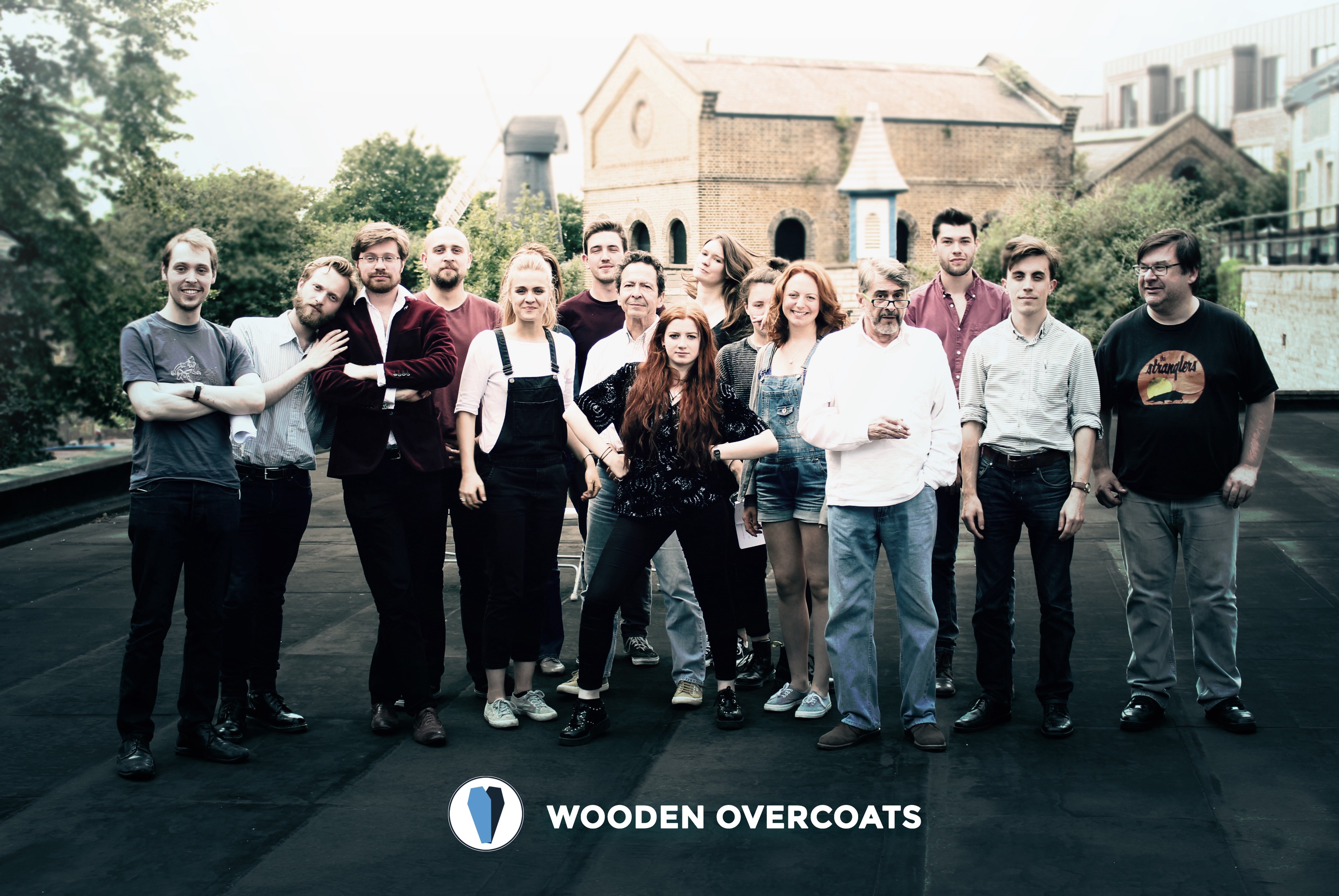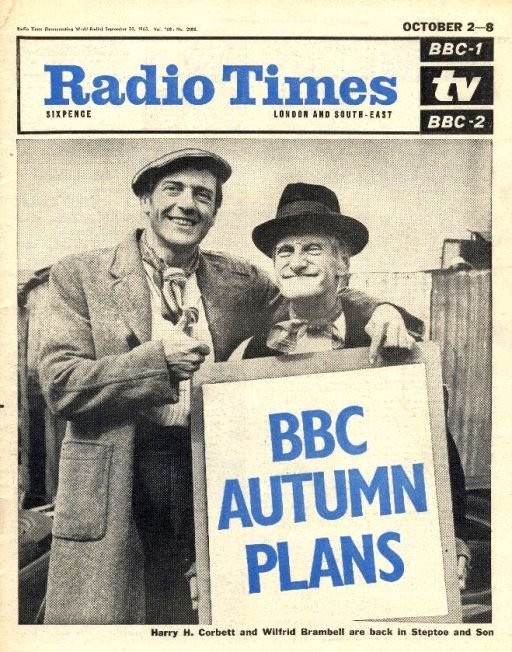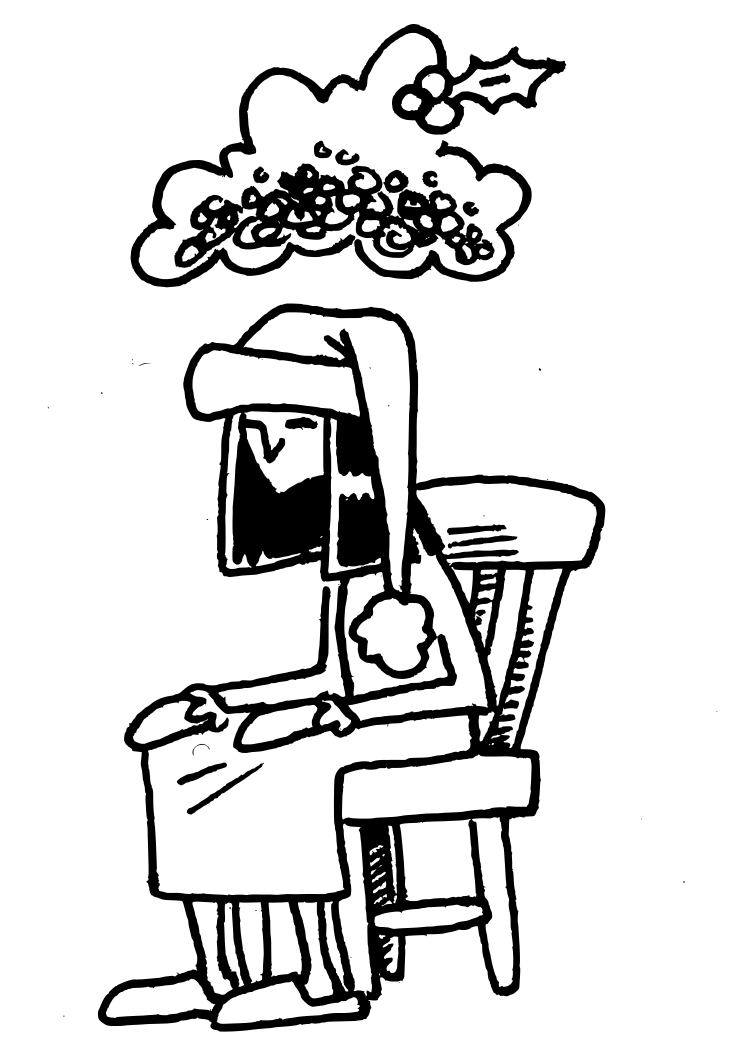by David K. Barnes
 John Wakefield, Tom Crowley, David K. Barnes, Pip Gladwin, Elle McAlpine, Andy Goddard, Andy Secombe, Ciara Baxendale, Beth Eyre, Betty Burns, Holly Campbell, Steve Hodson, Oscar French, Felix Trench, Paul Putner
John Wakefield, Tom Crowley, David K. Barnes, Pip Gladwin, Elle McAlpine, Andy Goddard, Andy Secombe, Ciara Baxendale, Beth Eyre, Betty Burns, Holly Campbell, Steve Hodson, Oscar French, Felix Trench, Paul Putner
In December 2014, I was given a one-line pitch and asked to develop it into a fully-fledged audio sitcom. I hesitated. Not for very long, because I was desperate for work, but I hesitated. I had written a single radio comedy already, but that was a serial, with one continuous story spread out over six episodes. My experience had otherwise been confined to the stage, in which ? as playwrights do ?I?d comprehensively explore an idea before tying off the story and ending it forever.
A sitcom, however, requires a premise that could go on indefinitely. And a constant stream of new ideas. Self-contained stories and long-term evolving arcs. Characters designed for lots of stories while remaining consistently consistent. Themes upon sub-themes to tie it all together.
And it?s got to be funny.
Creating, writing and developing Wooden Overcoats has been the biggest learning curve of my professional life so far. Here are just a few things I learned.
The Premise Has Got to be Rock Solid
If you don?t have the premise, you?re in for a tough time. It?ll be hard to write. Eventually it will be even harder to advertise and find its audience.
The premise isn?t just a setting. Or a character. It?s a self-perpetuating narrative with lots of actions and consequences. I have sat through sitcoms that had a very interesting setting but flapped around looking for stories because none came readily supplied with the premise. Ideally, you want to sum up your sitcom in one short line. (I?ve always found this an incredibly useful exercise in my writing, no matter the medium). If you can describe your idea succinctly, you?ll never forget what your story is about. That can be reassuring when you?re three hours off a deadline.
If you can describe your idea succinctly, you?ll never forget what your story is about.
The premise of Wooden Overcoats is: Two competing funeral directors on a Channel Island. There?s a lot more to the series than that but the premise is enough to stimulate stories and to suggest a tone and to entice an audience. There have been sitcoms about funerals before, sitcoms about rivalries, and sitcoms about islands and peculiar communities. But those three things thrown together gave us our premise. We got eight episodes out of it and have loads more ideas to come.
Characters Must Generate Stories
Your sitcom will need regular characters. If you are an especially gifted writer, you might only need one. Chances are, you?ll need more. Either way, no matter how many you have, those characters will need to create their own stories and should be designed with that in mind.
If you put your core cast in a room, could they sustain a scene?s worth of hi-jinks without outside interference? If they can, hurrah, you?re off to a flying start! Now, do those hi-jinks also get the plot started? Or maintained? Or concluded? They should. It?s unsatisfying if your lead characters are wholly reactive to events. It?s also much harder to write an episode if you constantly need to think up additional elements to force your characters to do anything. If you find yourself with no idea as to where your lead ought to be going, and what they should be doing when they get there (beyond ?having a funny conversation?), that character clearly isn?t generating ideas for you. You?ll have to rectify that.
In Wooden Overcoats, Rudyard Funn is a failing funeral director. He?s gripped with jealousy and envy toward his effortlessly successful rival, Eric Chapman. As a comic lead, Rudyard is driven a) to succeed in his business b) to generally better himself in the community and mainly c) to best Eric Chapman at something, anything. This means he embarks on various schemes to get what he wants. The result: Rudyard always generates action. This, in turn, creates stories.
There are regular supporting characters. For example, Rudyard?s assistant, Georgie Crusoe (pragmatic, unflappable, wants to experience new things). Characters like Georgie exist primarily to contribute to the plotlines created by the leads but they can inspire their own stories at a later date. Typically, the longer a sitcom goes on, the more the supporting characters will be able to contribute their own storylines. This increases the story options open to you, making the show much easier to write.
That said?
Characters Must Develop (but not too much)
Traditionally, characters in sitcoms don?t really change. The premises and situations are designed to be self-sustaining. Steptoe and Son was about a father and son trapped in their poverty and mutual spiteful co-dependence. If the son had actually managed to make good on his intention to leave his dad forever, the show would have ended. (As it happened, it ended because the writers ran out of stories ? after eight whole seasons of them). The challenge was to make the characters interesting, involving and entertaining without allowing them to change their circumstances too much and, well, break the show.
 Steptoe and Son returns for another series in 1965
Steptoe and Son returns for another series in 1965
Nowadays, sitcoms can be rather more flexible in this approach. Arrested Development is filled to bursting point with evolving narratives and character development. One episode of Arrested Development contains enough ideas to fill up a whole season of many traditional UK sitcoms. Audiences want greater complexity in their characters. They want to see them make decisions and engage in the resulting consequences. They want to be taken on a journey.
Arrested Development is filled to bursting point with evolving narratives and character development.
The new challenge is creating a premise loose enough to allow innovation within it, but not so loose as to ensure your sitcom isn?t really about anything. In Wooden Overcoats, the rivalry between Rudyard and Eric is paramount. Should they permanently patch up their differences, the series wouldn?t have anywhere to go. But the characters can still grow. Their attitudes can change, as can their methods, even the exact nature of their rivalry.
We also had Rudyard?s sister, Antigone Funn, who began as a supporting character trapped in the mortuary and, over the course of eight episodes, became gradually more independent and involved in the action. However, Antigone remains working at Funn Funerals and she retains the weirdness that made her an entertaining character in the first place. Her character development increases the number of stories we can tell about her.
 Antigone Funn (artist?s impression)
Antigone Funn (artist?s impression)
Every Scene Must Have a Point
You?ve got your premise. You?ve got characters and stories to tell about them. You choose one. It?s going to be brilliant! You?re excited. You start to write a scene. But for some reason, the dialogue? just isn?t happening. You?re finding it a real slog to write, and you?ve no idea how the scene is meant to progress to the next one. There could be many problems at play here but the most obvious one is: you?ve not done your plotting.
Oh sure, you?ve a general idea of how it?s going to go. But you haven?t worked out what exactly this scene contributes to the story. If it?s an early scene, is it establishing all the facts necessary for the story to get started as quickly as possible?
If it?s a mid-episode scene, is it mining existing events for humour while simultaneously creating new ones? And when you get to the end of your episode, is that final scene adequately tying up everything that?s happened before ? or are you struggling to resolve things? Worse, has your story pretty much ended five minutes too early? These kinds of problems always crop up with writing, no matter how much planning you put into it. Things develop as you write, and ideas that seemed good in the abstract suddenly don?t work on paper, and need a rethink.
Finding a planning model that works for you will help enormously. Here?s one: for every scene of Wooden Overcoats, I established in bullet points what the scene needed to accomplish and how I was going to try to make that entertaining. These don?t need to be detailed notes either. Episode 4 of Wooden Overcoats begins with Rudyard being put in charge of a village fete, something he?s spectacularly unsuited to do.
Idea: Establish in bullet points what the scene needs to accomplish.
This happened in scene 1. Now, if Rudyard had decided to go along with it too early, we?d lose opportunities for humour (Rudyard panicking, mainly). But the episode had nowhere to go until he did get on with it, so I couldn?t delay that indefinitely. Therefore I wanted a single scene that went like this: Rudyard goes home, panicking, and explains the situation to Antigone and Georgie who in turn persuade and inspire him to run the village fete anyway (unwittingly involving themselves in the process).
I got about five minutes of dialogue out of that very simple premise and that dialogue was relatively easy to write because a) the characters were designed to spark off each other, creating dialogue, and b) I knew what the scene needed to do.
No scene existed just to tell jokes.
Every Episode Must Have a Point
You?ve got to the end of the episode! You clever thing, you! You?ve got all your scenes. The sequence of events is pretty sound. The characters are propelling the action and talking to each other amusingly. And yet? there?s something missing.
Perhaps the dialogue still feels a little flat. Maybe the pace is lagging. And then suddenly you realise: this episode isn?t about anything.
Yes, your cast all joined the Navy, had wacky shenanigans, and went home again. But it all feels like an empty exercise in filling up time. Chances are, you didn?t really have an objective in writing the episode beyond: ?Write something funny.? Sometimes, that might genuinely be enough, but sitcom is all about character and characters need to go on journeys or we won?t be interested. They need ingrained reasons to engage in your comic plots. And those reasons will ensure your dialogue is sharp, the stories gripping, and that the audience will laugh that little bit harder.
The episode I wrote that I?m most proud of is Episode 6. The advertised plotline is about a sea captain pitting Rudyard and Eric against each other in a bizarre competition. However, that provides a humorous backdrop (and narrative propulsion) to an emotional crisis point between Rudyard and Antigone.
The episode is about Rudyard?s obsession and what happens when he?s directly confronted with it. That gave the dialogue an edge, gave me the basis for a twisty-turny narrative, and ensured that the comedy had higher stakes.
And this leads us almost full circle to?
Every Sitcom Must Have a Point
I said that a situation isn?t enough for a sitcom; you need a premise that inspires lots of potential stories. But for those stories to really engage the audience on an emotional level ? to make them really stick in the memory ? they all need to be about something. And, preferably, all those somethings will feed off each other to give you one Big Something. And that Big Something is what the series is about. You might not find it until you?re already knee deep in scripts. It might arise naturally over time. But maybe ? I?d say hopefully ? you?ll know before you?ve typed your first word. It?ll change, and transform, and adapt, but I think you need to have a gut instinct about why you?re writing about what you?re writing. What is the Big Something that you want to explore? And how are you going to make it funny?
I really wanted to write about envy. It was, and remains, my biggest sin. Feeling bad about yourself when your friends are doing well, and the emotional results of that. It was gnawing at me every day, and churning me up, and I needed a release. When I was given: Two competing funeral directors, I knew I had an outlet. So I seized the opportunity to say: this is what it?s like. This is how it feels. And the other writers did the same. And we did our best to make it funny.
Oh, and one more thing:
Allow the Unexpected
So much of this series wasn?t planned. I know I?ve spent ages banging on about plotting and devising and working things out. That?s because this article is about what I?ve learned and hope to implement rather more quickly in the future. It took me a while to get there.
But so many incredible things happened by chance. The perfect plot point. A gem of a character. One of the other writers ringing me up and saying, ?I?ve just had an idea?? Some entire character arcs came together when I received all the scripts and then went: ?Hang on? If I put this episode here, and this episode there? And rewrite that line? And stick in a new scene here? Good Lord! It works!?
If something wonderful happens, and you can feel it?s the right thing to do, go with it. Even if it means rewriting a whole script, or changing the ending of the series (episode 8 had about five different versions until I leapt upon the ?correct? way to do it).
Basically: always know where you?re going, but don?t be afraid to take the odd detour. You?ll be much happier that way.
David K. Barnes is an accomplished playwright and head writer of Wooden Overcoats, based in London. Follow his work at www.davidkbarnes.com. If you like what you?ve read, be sure to hit recommend below to pass it along to your followers, and to follow Panel & Frame for more emerging voices in Film, Comics, Literature, and Art!


